How do you generate leads from LinkedIn without spending hours on manual sales prospecting? Scraping LinkedIn data can give you the insights you need—fast.
But with LinkedIn tightening its security and automation rules, how do you do it effectively in 2025?
Here are the best ways to extract valuable data while staying compliant and efficient.
AI highlights
- LinkedIn data scraping automates the extraction of publicly available LinkedIn information for lead generation, prospecting, and research.
- Benefits of LinkedIn scraping include saving time and boosting productivity, improving sales outreach and prospecting, and enhancing research.
- To scrape LinkedIn data, you can either use a LinkedIn scraper for automated, user-friendly data collection or LinkedIn’s official API, which is more technical.
- Here are 6 smart ways to scrape data from LinkedIn:
| Tactic | Description | Best Tool |
| Leverage LinkedIn search results | Scraping data straight from a LinkedIn search to create a comprehensive lead list. | LinkedIn Search Export |
| Export LinkedIn event attendees | Getting a list of people attending industry-related events to pinpoint LinkedIn contacts with specific interests. | LinkedIn Event Guests Export |
| Scrape valuable LinkedIn profile data | Scraping a user’s LinkedIn profile (or multiple profiles) to enrich your prospecting list. | LinkedIn Profile Scraper |
| Extract LinkedIn post likers and commenters | Scraping data showing who interacts with a company’s LinkedIn posts can indicate buyer intent. | LinkedIn Post Commenter and Liker Scraper |
| Scrape LinkedIn group members | Identifying LinkedIn users within an industry-related group to target the right communities. | LinkedIn Group Members Export |
| Leverage LinkedIn Sales Navigator data | Scraping Sales Navigator data to fuel competitor analysis. | Sales Navigator Account Scraper |
1. Use a LinkedIn data scraper
LinkedIn data scrapers automatically extract information from LinkedIn profiles, pages, or groups.
These scrapers pull public data, allowing you to build comprehensive lead lists, enrich your CRM, and streamline your LinkedIn prospecting.
With a LinkedIn scraper, you can quickly identify prospects, monitor industry trends, and discover new opportunities—all with minimal effort.
One popular option is PhantomBuster, a lead generation automation tool that offers over 100 pre-built workflows running across major social platforms (including LinkedIn scraping tools).
Using PhantomBuster to get started with LinkedIn scraping is simple:
- Sign up for a PhantomBuster account: There’s a 14-day free trial, no credit card required.
- Download PhantomBuster’s Chrome extension: This will allow PhantomBuster to run LinkedIn scraping workflows from your profile.
- Browse the automation library: Choose from dozens of pre-built automations to kickstart your LinkedIn scraping journey.
- Launch your LinkedIn scraper: Decide what information you want to scrape, connect your LinkedIn profile via the Chrome extension, choose your settings, and launch your LinkedIn automation tool.
You’ll get the results in your dashboard, so your leads list is ready for the next phase of your LinkedIn outreach.
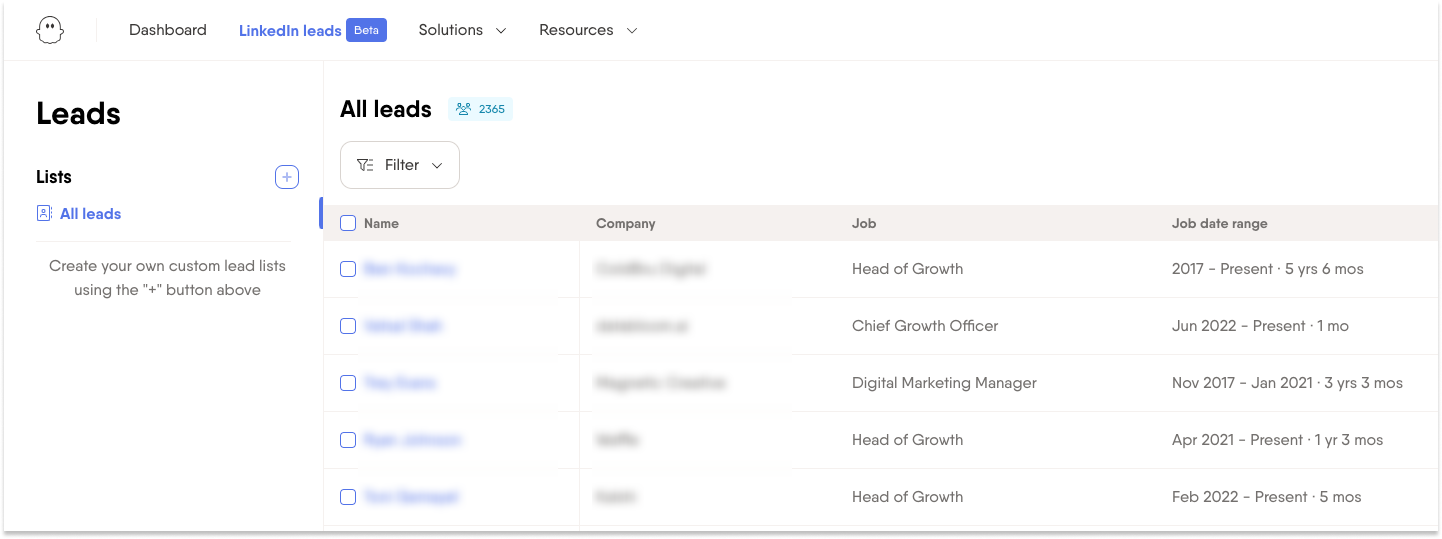
2. Use LinkedIn’s official API
Using LinkedIn’s official API is a method for extracting data directly from LinkedIn, ensuring that you’re accessing public information with their permission.
The LinkedIn API lets you pull detailed information from profiles, such as user IDs, names, cities, job titles, and work experience.
In addition, you can access data on company details and posts, making it a versatile tool for generating leads.
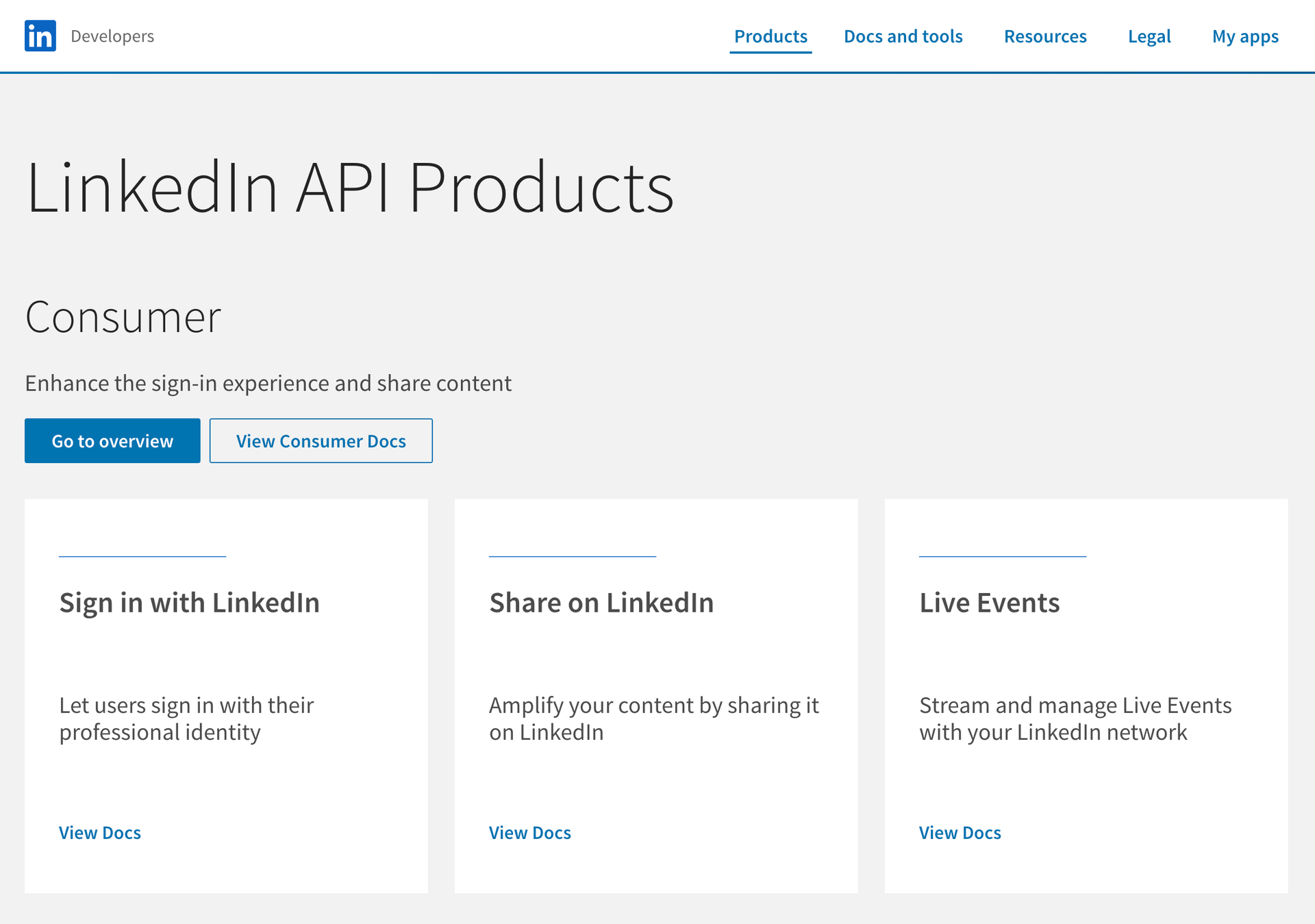
However, there are some caveats:
- You must be a LinkedIn Partner: This process can be lengthy and restrictive.
- You must have extensive technical knowledge: The API is primarily designed for developers and businesses with highly technical infrastructures.
- You must handle it cautiously: It’s easy to get caught by issues like rate limits or data inaccuracies.
Due to its complexity, the LinkedIn API won’t be the right fit for everyone.
Generally, most sales and marketing teams will prefer investing in LinkedIn scraping tools, such as PhantomBuster’s LinkedIn scraper automations.
6 ways to export LinkedIn data using a LinkedIn scraper
Exporting valuable LinkedIn data can help you find leads to grow your sales pipeline, analyze trends, and streamline your outreach.
Below are 6 effective ways to extract data, along with the best LinkedIn scraping tools:
1. Leverage LinkedIn search results
Leveraging LinkedIn search export results lets you turn a LinkedIn search into a powerful list of potential clients who match your ICP.
Whether targeting a specific industry, job title, or company, exporting LinkedIn search data helps you build a high-quality prospecting list. Plus, you’re free from the hassle of copying and pasting details manually.
We recommend using PhantomBuster’s LinkedIn Search Export automation to scrape and export data from LinkedIn search URLs. Just paste the URL into the LinkedIn scraper, connect your LinkedIn account, and launch the automation.
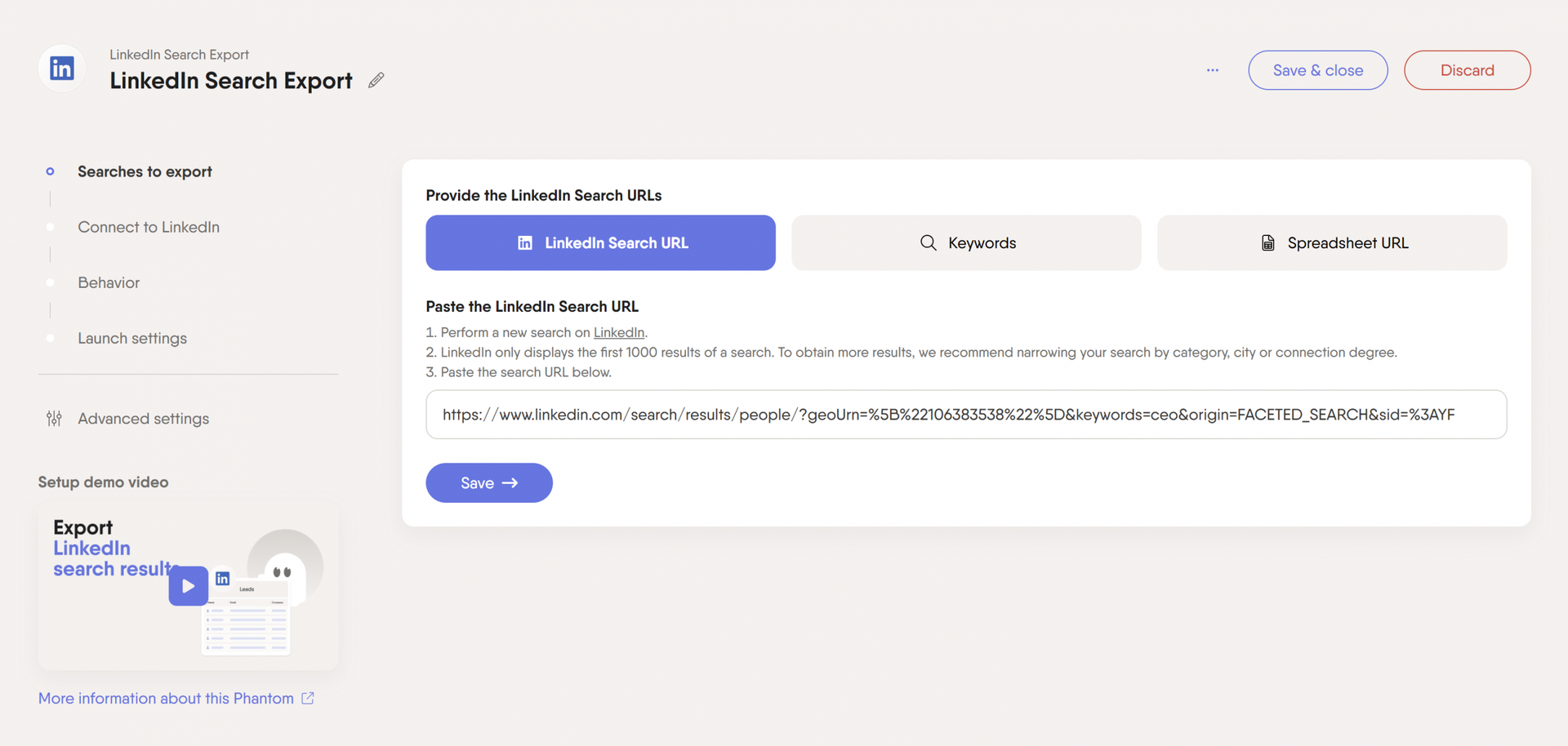
From there, you’ll get a list of leads who match your criteria that you can use for outreach.
2. Export LinkedIn event attendees
Exporting LinkedIn event attendees involves gathering the list of participants from a specific event hosted on the platform.
With a list of event attendees, you can engage with potential leads who have already expressed interest in your field, increasing your chances of conversion.
With the LinkedIn Event Guests Export tool, you can extract the attendees from any LinkedIn event. Connect to LinkedIn using the browser extension, then run the automation to download a CSV file.
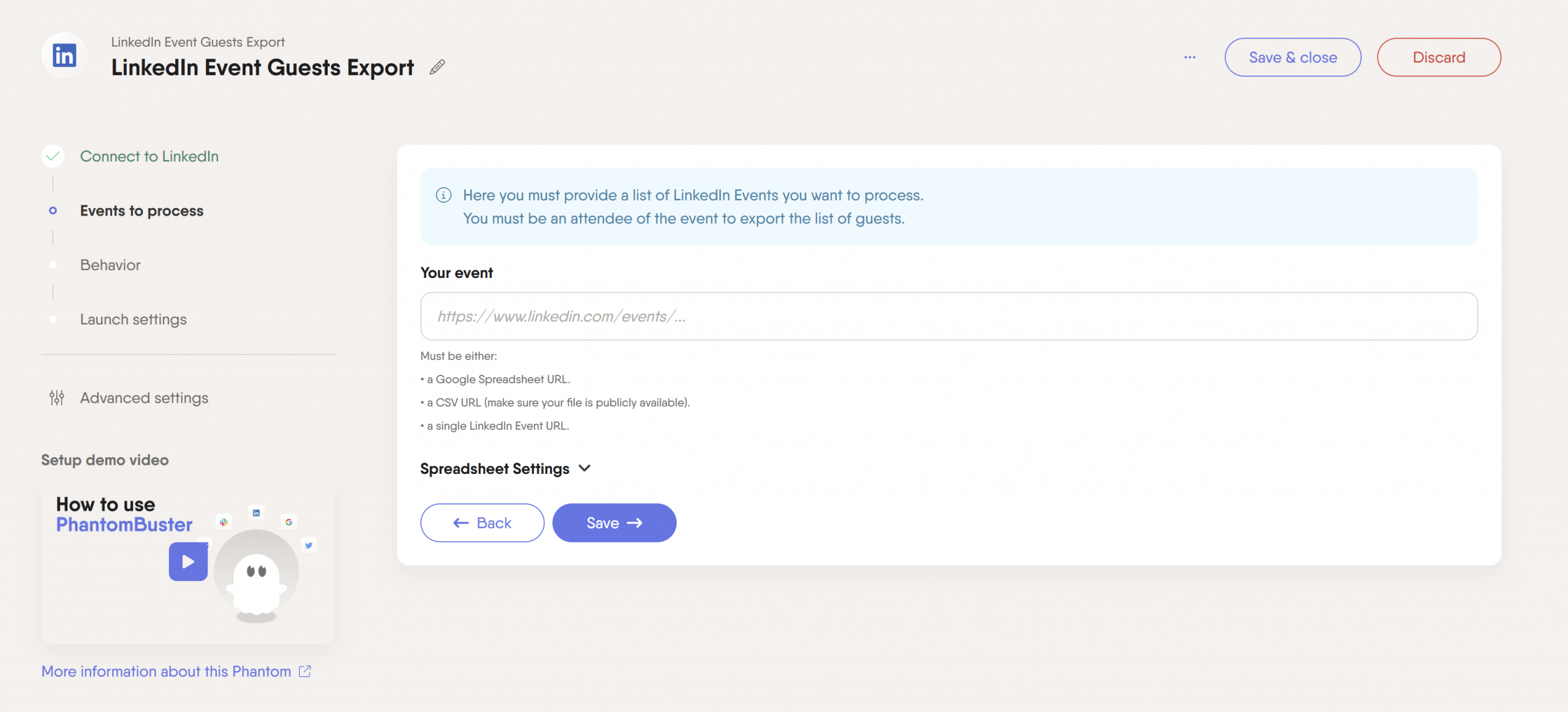
This data can then be uploaded to your ‘LinkedIn leads’ page in PhantomBuster if you want to keep running automation workflows on this list, exported to your CRM, or edited in a spreadsheet.
3. Scrape valuable LinkedIn profile data
Scraping LinkedIn profile data is an automated method to gather publicly available details from LinkedIn profiles. It collects a wide range of information from each profile, making it easier to understand your prospects.
When you scrape LinkedIn profiles for enriched data, your CRM becomes more accurate, enabling you to better qualify leads and craft more targeted LinkedIn outreach campaigns.
Try out the LinkedIn Profile Scraper, which will automatically visit the profiles on your list and scrape every piece of public data (including emails) on your behalf.
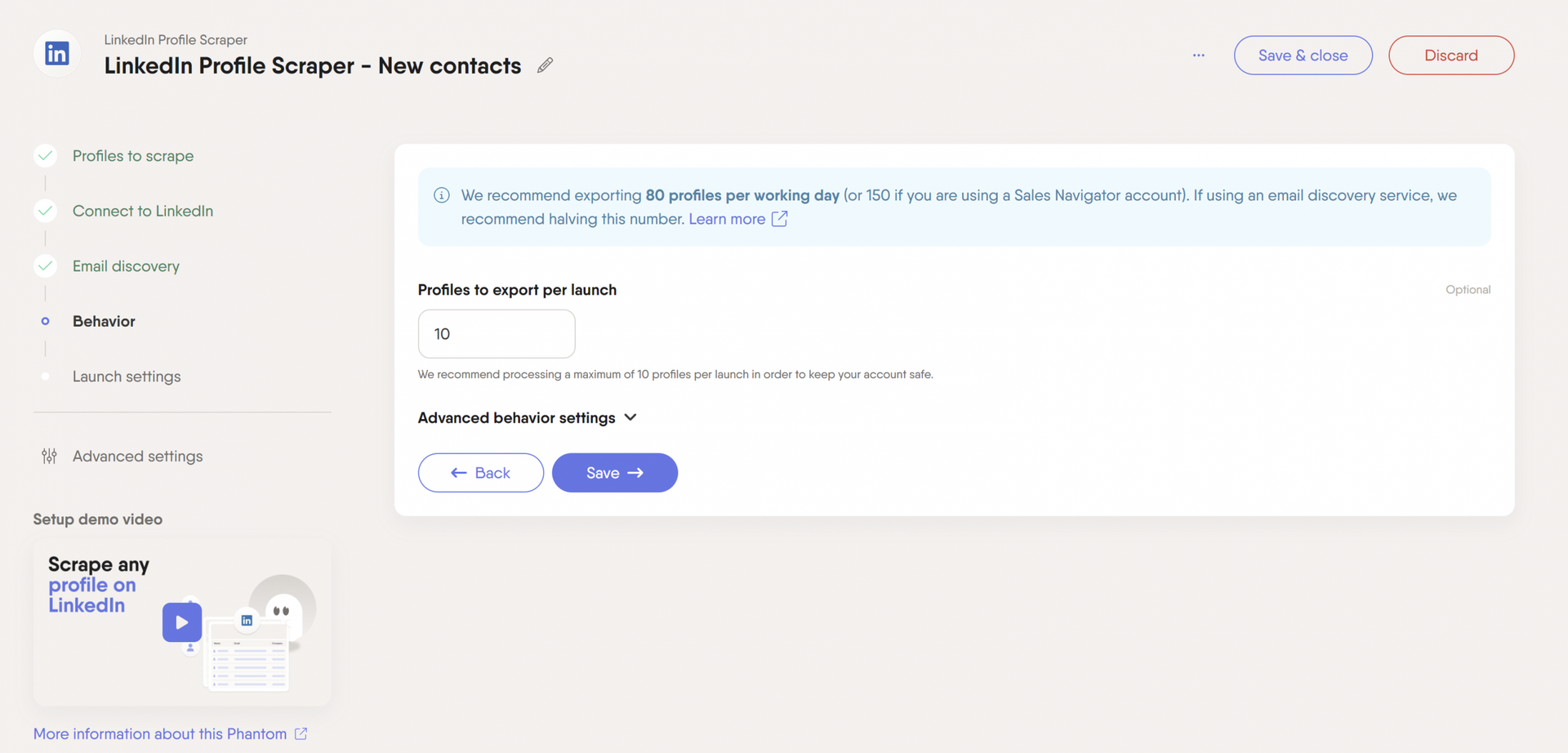
The LinkedIn Profile Scraper pulls over 70 data points—from name, current job title, company, and education to contact details and “Open to Work” or “Hiring” flags.
This data can then be integrated directly into Google Sheets or HubSpot, so your prospecting list stays current without you lifting a finger.
4. Extract LinkedIn post likers and commenters
This method gathers profiles of individuals who engage with LinkedIn posts through likes and comments, turning interactions into a valuable source of leads.
Engagement on LinkedIn posts often signals high intent, as those who interact are already interested in the content. By capturing this data, you can target prospects more likely to respond positively to your outreach campaigns.
We recommend using the LinkedIn Post Commenter and Liker Scraper to extract data from LinkedIn posts, such as the list of people who interacted with your competitors’ or industry-influencers’ posts.
This automation tool gives you a valuable list of people to engage with and lets you monitor what they share in their comments, helping you understand their needs and tailor your outreach.
5. Scrape LinkedIn group members
Scraping LinkedIn group members involves automatically collecting data from LinkedIn groups so you can extract valuable leads or even extend your network.
Exporting group members helps you tap into communities with shared interests, enabling you to reach out with targeted messaging and build a more engaged audience.
The LinkedIn Group Members Export tool connects to LinkedIn on your behalf and processes the groups you provide as input.
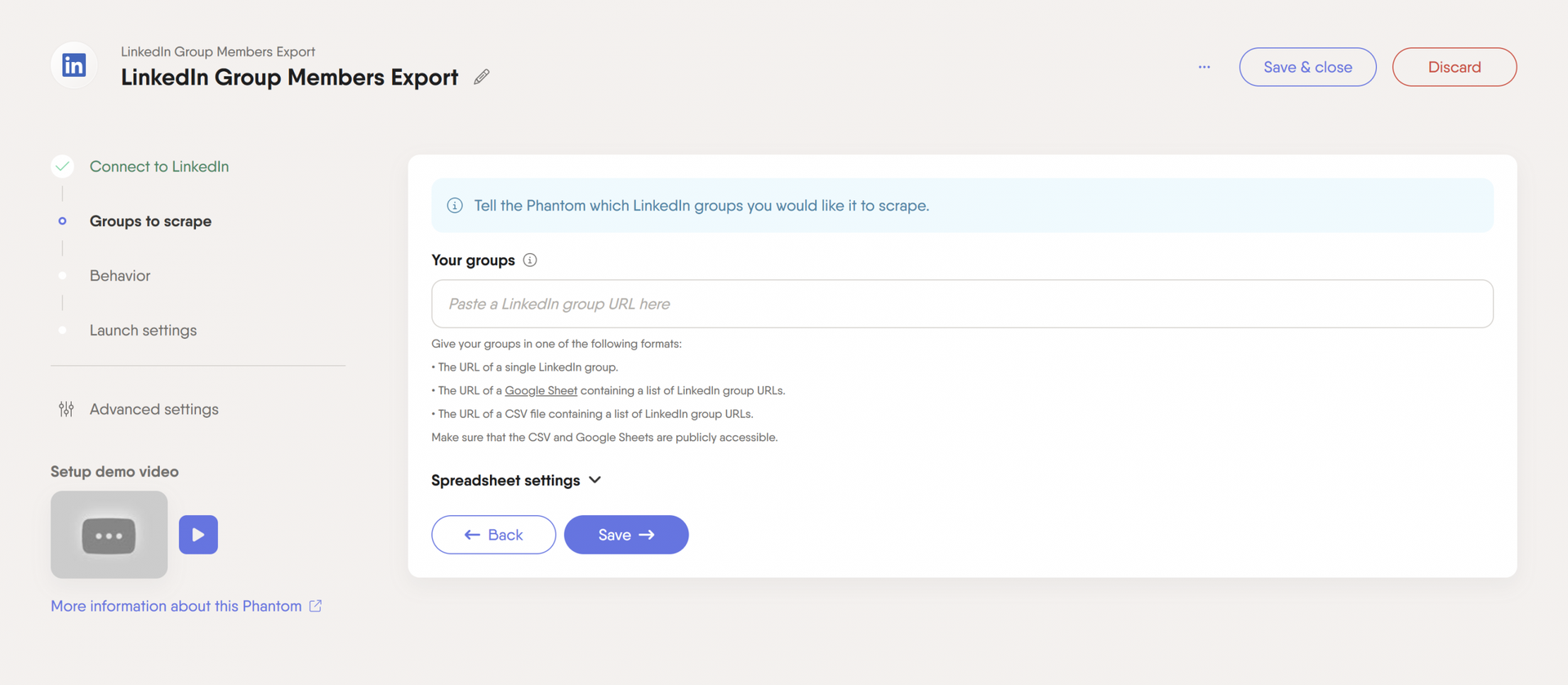
It automatically extracts up to 2500 members of a LinkedIn group on your behalf in just a few easy steps.
6. Leverage LinkedIn Sales Navigator data
This method uses automation to extract in-depth data from LinkedIn Sales Navigator accounts and gathers critical information that would otherwise require extensive manual research.
LinkedIn Sales Navigator holds a wealth of information about target companies, including decision-makers and key connections.
By automating data extraction, you can quickly enrich your CRM, uncover potential leads, and set up more effective, targeted sales prospecting.
With the Sales Navigator Account Scraper, you can scrape essential company details like basic company info, address, website, so you can investigate your favorite leads and gather all the arguments needed to turn them into your clients.
Best LinkedIn scraping tools
Ready to scrape LinkedIn data and boost your lead generation strategy?
Keep in mind that the best LinkedIn scraper will offer comprehensive data extraction capabilities, an affordable price, and CRM integrations to complement your outreach.
Here are some of the best web scraping tools to get you there.
1. PhantomBuster
PhantomBuster simplifies LinkedIn data scraping by running it on autopilot. With an easy-to-use interface and pre-built workflows, it saves you time while building accurate, enriched lead lists.
Whether you’re targeting profiles or companies, PhantomBuster offers a comprehensive solution for your data needs—and the CRM integrations to match.
Best features
- Scrape LinkedIn Sales Navigator data: Automatically gather detailed company information.
- Export company employee data from LinkedIn: Extract employee lists and decision makers.
- Extract LinkedIn profile data: Collect public data from profiles, including job titles, emails, and more.
- Get LinkedIn profile URLs: Quickly find LinkedIn profiles from your prospecting list for targeted outreach.
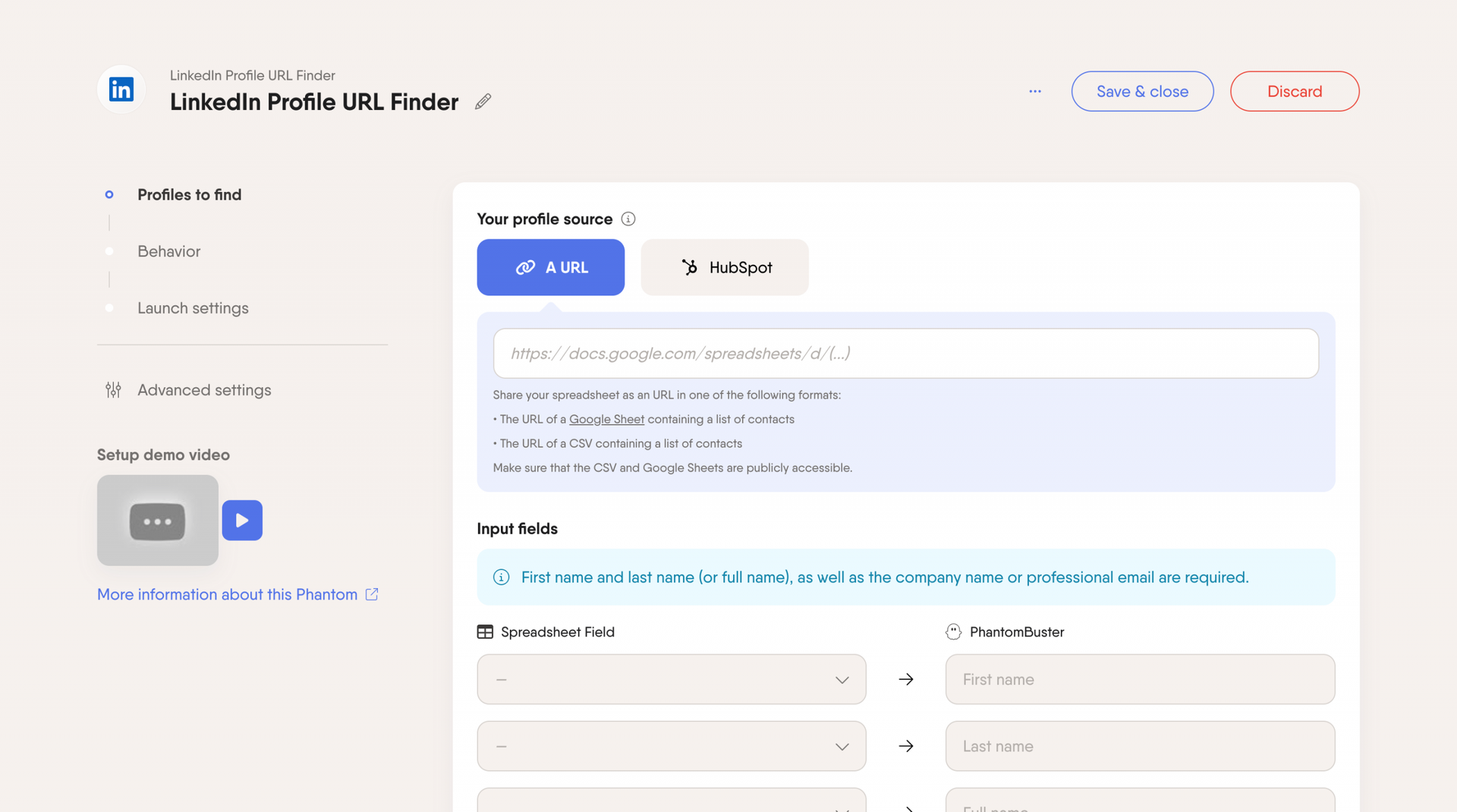
- Gather LinkedIn posts’ data: Capture insights from post interactions, including likers and commenters, to identify high-intent leads.
- Harness LinkedIn job data: Use the LinkedIn Job Scraper to gather all available data from LinkedIn job listings.
- Collect LinkedIn company data: Export LinkedIn companies’ details to enhance your market research and lead generation.
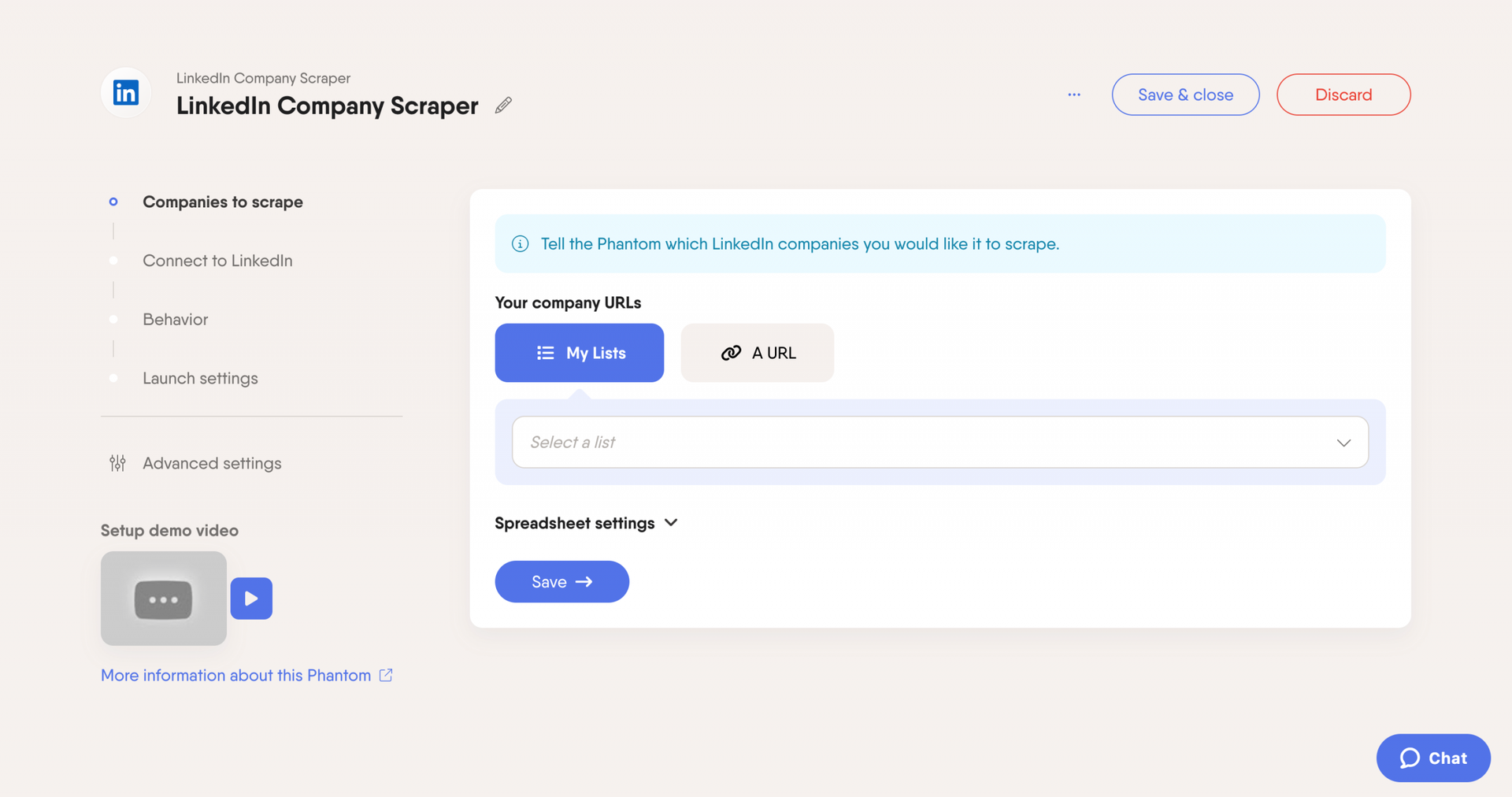
- Plug the LinkedIn data into your CRM: With downloadable results files, plus integrations with main CRMs like HubSpot, you can easily channel the data into your next outreach campaign.
Pricing
PhantomBuster’s annual plan pricing starts at $56 per month. This includes 20 hours of execution time, 5 automation slots, unlimited data exports, and 10,000 AI prospecting credits per month.
2. Evaboot
Evaboot offers a streamlined approach for scraping data from LinkedIn Sales Navigator.
It uses a simple Chrome extension to export lists and searches to CSV, ensuring the data you collect is accurate and up-to-date.
However, Evaboot can only operate on a paid LinkedIn Sales Navigator account rather than a LinkedIn basic plan.
Best features
- Get quick exports: Easily export lists and search results from Sales Navigator to CSV.
- Extract accurate data: Automatically clean and standardize names, job titles, and company names.
- Confirm your filters: Verify that your leads match your Sales Navigator search criteria.
- Use email discovery: Use built-in scraping and email finder algorithms to locate professional emails.
- Validate emails: Test and confirm the deliverability of discovered email addresses.
Pricing
Evaboot’s annual plan pricing starts at $8 per month. While this might sound appealing as an affordable web scraping tool, remember that it only works with a paid Sales Navigator account.
3. Kaspr
Kaspr is designed to automatically collect data from LinkedIn, making it easier to connect with prospects.
With a free signup and a simple Chrome extension, Kaspr offers instant access to valuable contact information, which you can manage and enrich through its intuitive dashboard.
Best features
- Leverage instant contact retrieval: Quickly gather LinkedIn contact details via the Chrome extension.
- Manage your contacts via the dashboard: Organize and enrich potential clients and create LinkedIn outreach campaigns.
- Integrate with sales apps: Connect with other platforms to complement your LinkedIn data collection workflows.
- Unlimited B2B emails: Access an unlimited supply of B2B email addresses at no extra cost with a paid plan.
Pricing
Kaspr’s pricing starts with a free plan, which includes 15 B2B email credits and 5 credits to scrape phone numbers. Paid plans then start at $49 per month.
LinkedIn data scraping FAQ
What is LinkedIn data scraping?
LinkedIn data scraping is the process of extracting publicly available information from LinkedIn. This can include company followers, profile details, job postings, or post insights.
For example, you can export LinkedIn Sales Navigator searches to build a list of potential leads or analyze a prospect’s recent posts to personalize outreach.
What are the benefits of LinkedIn data scraping?
- Boost lead generation: Extract targeted prospect lists to fuel your pipeline.
- Improve outreach personalization: Scrape LinkedIn leads’ activity and engagement to craft more relevant messages.
- Enhance market research: Track industry trends, competitor moves, and hiring patterns.
- Save time and increase productivity: Automate data collection instead of manually searching for leads.
- Optimize sales prospecting: Export and enrich Sales Navigator searches to find decision-makers faster.
Is LinkedIn scraping legal?
Yes, it is legal to scrape LinkedIn, as long as you:
- Scrape publicly available data only. This means you should avoid gathering any information that’s been restricted or is considered private or sensitive.
- Respect LinkedIn’s terms of service and ensure that you use the platform in a way that doesn’t compromise its integrity.
- Avoid excessive automation workflows that violate LinkedIn’s terms. Be mindful of the volume and frequency of your workflows.
By keeping these points in mind, you can safely leverage LinkedIn scraping tools to support your lead generation and market research efforts.
How to scrape LinkedIn data ethically?
- Use a trusted LinkedIn scraper tool: Choose a platform like PhantomBuster that ensures compliance with LinkedIn’s limits.
- Only scrape public data: Avoid collecting private or sensitive user information.
- Control your activity: Stick to safe usage limits to avoid account restrictions.
- Be transparent: If asked, be honest about your data usage and ensure it aligns with ethical practices.
